
How to Become an AI Engineer: A Practical Guide
Mar 29, 2025 5 Min Read 1995 Views
(Last Updated)
In a world where technology is evolving faster than ever, AI is the real superhero working behind the scenes, transforming industries, and making everyday gadgets smarter. Imagine having the power to create systems that can think, learn, and solve problems on a massive scale. That’s what being an AI engineer is all about!
With a unique mix of data science, software expertise, and machine learning, AI engineers are building the future of tech, one algorithm at a time. If you’re excited about wielding tech superpowers and solving big challenges, this guide will walk you through how to kickstart your career as an AI engineer. Ready to suit up and dive into one of the coolest fields out there?
In this blog, you’ll find everything you need to start your journey as an AI engineer from essential skills and learning pathways to hands-on projects and career tips to help you break into this exciting field.
Table of contents
- What does an AI Engineer do?
- The Core Skills Every AI Engineer Needs
- Mathematics & Statistics:
- Programming Proficiency:
- Data Management and Analysis:
- Machine Learning & Deep Learning:
- Natural Language Processing and Computer Vision
- Big Data & Cloud Computing:
- Explore Educational Pathways
- Build a Portfolio That Stands Out
- GitHub and Personal Websites
- Earn Practical Experience
- Project-Based Learning
- Internships:
- Freelance Projects and Open Source:
- Participate in AI Competitions
- Expand your Network
- Find Your Niche
- Natural Language Processing (NLP)
- Computer Vision:
- Robotics and Autonomous Systems
- Reinforcement Learning
- AI Ethics and Responsible AI
- Generative AI
- Keep Up with Trends and Emerging Technologies
- Follow Influential AI Researchers
- Participate in AI Hackathons and Competitions
- Enroll in Advanced Online Courses
- Experiment with New Tools and Frameworks
- Wrapping Up
- Frequently Asked Questions
- What qualifications do you need to be an AI engineer?
- How long does it take to become an AI engineer?
- Is AI hard to study?
What does an AI Engineer do?
Artificial intelligence is reshaping how industries operate, from healthcare and finance to transportation and entertainment. But what exactly does an AI engineer do?
AI engineers design and develop systems that use machine learning and deep learning models to make decisions, automate tasks, and analyze data. They create solutions that are integral to applications like chatbots, recommendation engines, self-driving vehicles, and much more. AI engineering combines programming, data analysis, and problem-solving, basically, the skills that are highly valued in today’s job market.
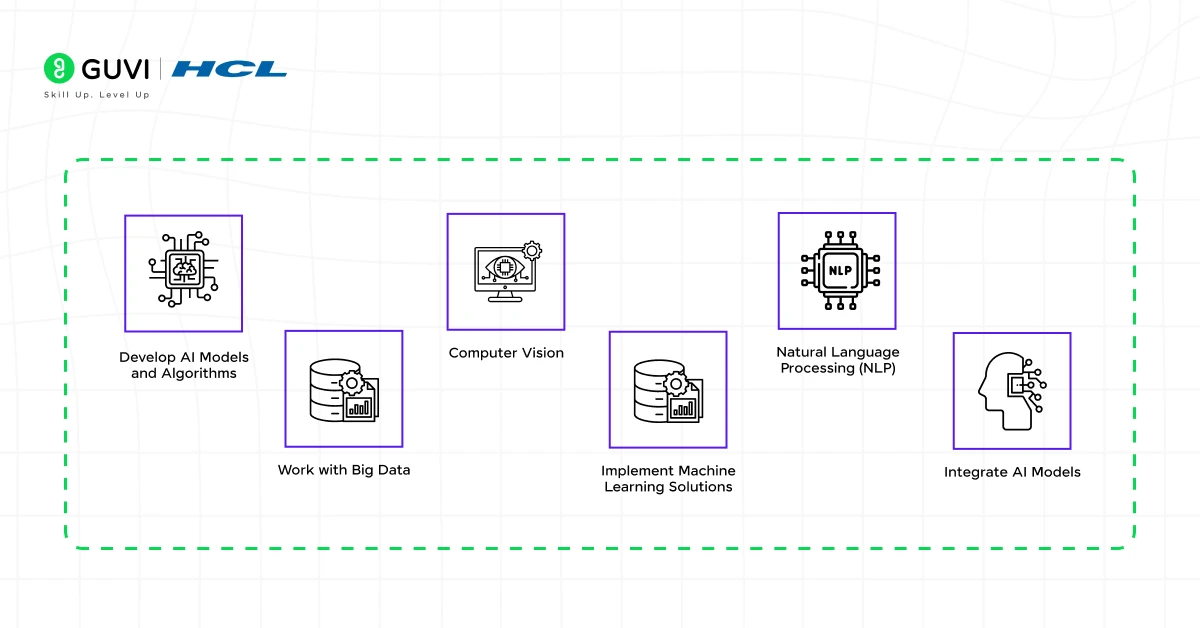
The Core Skills Every AI Engineer Needs
To succeed as an AI engineer, you need a combination of technical skills and analytical thinking. Here’s a breakdown of the key skills:
Mathematics & Statistics:
A solid understanding of linear algebra, calculus, probability, and statistics is foundational for machine learning algorithms and data analysis.
Programming Proficiency:
Python is essential in AI due to its libraries (like TensorFlow and PyTorch), but knowledge of R, Java, or C++ can add versatility.
Data Management and Analysis:
Data is at the heart of AI. Skills in data wrangling with tools like Pandas, NumPy, and Matplotlib, as well as SQL for database handling, are crucial for preparing data for models.
Machine Learning & Deep Learning:
Familiarity with ML algorithms and neural networks is vital. Libraries like Scikit-Learn for ML and TensorFlow/PyTorch for deep learning are tools every AI engineer should master.
Natural Language Processing and Computer Vision
For those interested in specialized fields, knowledge of NLP tools like NLTK or transformers and computer vision frameworks (like OpenCV) can open doors to many AI applications.
Big Data & Cloud Computing:
As AI projects often involve vast datasets, understanding big data tools (Hadoop, Spark) and cloud platforms (AWS, GCP, Azure) will help you scale and manage AI applications.
Explore Educational Pathways
Becoming an AI engineer does not require a one-size-fits-all approach; there are multiple pathways to build the necessary skills. Here’s how to get started:
A degree in computer science, data science, or AI provides a strong foundation. But degrees are not the only way possible, certifications and AI online courses can cover the same essentials. Look for programs focusing on Python for AI, deep learning, or data science fundamentals.
Ed-tech platforms like GUVI offer a targeted Artificial Intelligence and machine learning course that includes expert mentorship, project-based learning, hands-on practice, and placement assistance, helping you build skills progressively.
Build a Portfolio That Stands Out
Your portfolio demonstrates your expertise and is crucial to getting your skills noticed by employers. Here’s how to build an impressive AI portfolio:
- Start small with projects like building a simple chatbot, predicting house prices, or creating a basic image recognition model. These will solidify your understanding of machine learning concepts.
- Once you build confidence, move on to more complex projects like recommendation engines, language translators, or real-time face recognition systems. These projects showcase advanced skills and problem-solving abilities.
GitHub and Personal Websites
- Host your projects on GitHub to demonstrate your coding proficiency.
- You can also create a personal website that allows you to create a professional presentation of your work.
- Documenting your projects and explaining the efforts and process behind the scenes can significantly boost your credibility.
Earn Practical Experience
Gaining hands-on experience is essential for translating skills into practical applications. Here are some effective ways to get that experience:
Project-Based Learning
As discussed earlier, gain practical experience by building the projects for your own portfolio. You will also get a chance to learn from your own mistakes when you develop your skills this way. But, remember to choose the right guide to develop your skills first and then find ways to demonstrate them. Here are some project ideas for you:
- Voice Assistant with Custom Commands
This project involves creating a voice assistant that listens to user commands, processes the input using natural language processing (NLP), and performs predefined actions. Unlike generic assistants, this one focuses on executing a set of tailored commands for personal or business use.
By the end of this project, you’ll have a functional voice assistant that can handle a set of predefined commands, execute tasks, and respond conversationally. This project will strengthen your skills in speech processing, NLP, API integration, and task automation.
- Spam Email Classifier
The Spam Email Classifier is a supervised learning project where a dataset of labeled emails is used to train a model. The email text is preprocessed to extract relevant features, such as word frequency, length, and other linguistic patterns. These features are fed into a machine learning algorithm to classify new, unseen emails as either spam or legitimate. A functional classifier capable of identifying spam with high accuracy is the expected outcome of this project.
The chatbot will leverage natural language understanding (NLU) to recognize user intents and respond accordingly, offering human-like interactions. The project aims to streamline customer support operations, reduce response time, and improve user experience. A functional chatbot capable of handling FAQs and user queries is the expected outcome.
Internships:
Apply for internships at tech firms, AI startups, or research institutions where you can work on real projects and gain insights from experienced engineers.
Freelance Projects and Open Source:
Register to platforms like Upwork or GitHub that allow you to work on freelance AI projects or contribute to open-source projects, building practical experience and a reputation.
Participate in AI Competitions
Sites like Kaggle provide data science and AI challenges that let you apply your skills to real-world problems. These competitions are a great way to strengthen problem-solving skills and learn new techniques.
Expand your Network
The AI field is constantly evolving, making networking and staying updated essential for success. Here’s how to build your network and gain insights from the AI community:
- Communities like Reddit’s r/MachineLearning, GitHub’s AI projects, or Stack Overflow are invaluable for learning, discussing, and troubleshooting AI challenges.
- Attend conferences, or virtual events where AI engineers gather. Participate in LinkedIn discussions that talk about cutting-edge AI research and offer networking opportunities.
- Staying updated on AI trends is easier when you follow industry leaders, follow AI hashtags on LinkedIn, and participate in webinars. This habit keeps you informed about the latest tools, techniques, and industry shifts.
Find Your Niche
AI engineering is a broad field, and finding your niche allows you to deepen your expertise and stand out in the industry. Specializing in a specific area can lead to more targeted AI job opportunities and align your work with your interests. Here are some popular AI specializations to consider:
Natural Language Processing (NLP)
If you’re fascinated by how machines can understand and generate human language, NLP is for you. NLP powers applications like chatbots, language translation, sentiment analysis, and voice recognition. Tools like NLTK, spaCy, and transformer models (such as BERT and GPT) are essential here.
Computer Vision:
This field focuses on enabling machines to interpret and analyze visual information from the world, similar to human sight. Computer vision powers applications in facial recognition, autonomous driving, healthcare imaging, and augmented reality. You’ll work with libraries like OpenCV, TensorFlow, and PyTorch to build models that “see” and make sense of images or videos.
Robotics and Autonomous Systems
If you’re interested in bringing AI to life in physical form, robotics might be your niche. AI engineers in robotics design intelligent systems for drones, self-driving cars, and industrial robots. This field requires knowledge of computer vision, control systems, and reinforcement learning.
Reinforcement Learning
Specializing in reinforcement learning means focusing on training AI agents to make decisions through trial and error, much like how humans learn from experience. It’s ideal for building applications like game AI, robotic movement, and even financial trading algorithms. Knowledge in reward-based systems, dynamic programming, and Markov decision processes is key here.
AI Ethics and Responsible AI
This growing field focuses on ensuring AI is designed and deployed ethically. Specialists here work on AI fairness, transparency, and accountability, making sure AI models are unbiased, explainable, and respectful of privacy. This niche combines technical knowledge with a strong understanding of societal impact, making it ideal for those interested in the ethical side of AI.
Generative AI
Generative AI involves creating models that generate new content, like images, music, or text. This specialization powers tools like deepfakes, image-to-image translation, and AI art. If you’re interested in creativity and innovation, this field offers a unique blend of artistic and technical challenges. Key technologies include GANs (Generative Adversarial Networks) and transformers.
Keep Up with Trends and Emerging Technologies
The world of AI moves fast, with new trends and technologies appearing regularly. It is crucial to stay at the forefront of the dynamic field and keep updating.
Follow Influential AI Researchers
Top researchers, along with companies like OpenAI, DeepMind, and Google AI, often share insights and updates on social platforms like Twitter and LinkedIn. Following them keeps you connected to top voices in the field.
Participate in AI Hackathons and Competitions
Hackathons like GUVI’s SAWiT.ai, a series of ground-breaking events (Learnathon + Hackathon) that aim to propel women in tech to the forefront of AI development. These kinds of hackathons challenge participants with new AI problems and require using the latest algorithms and tools. These events can push you to try out emerging technologies in a collaborative environment.
Enroll in Advanced Online Courses
Platforms like GUVI offer a full-fledged Artificial Intelligence & Machine Learning course along with targeted courses on emerging topics like transformer models, reinforcement learning, and explainable AI. Taking these courses can deepen your expertise and expand your skill set.
Experiment with New Tools and Frameworks
As AI technology advances, new AI tools like PyTorch Lightning, Hugging Face Transformers, and JAX continue to emerge. Experimenting with these can give you hands-on experience and help you understand their practical applications in real-world projects.
Wrapping Up
The journey to becoming an AI engineer is as exciting as it is challenging. It requires persistence, creativity, and a commitment to lifelong learning. From mastering essential technical skills and building a standout portfolio to gaining hands-on experience and networking within the community, each step brings you closer to your goal. While the path may be demanding, the impact you can make as an AI engineer is profound, reshaping industries and even society as we know it.
The field awaits, full of opportunities for those who are prepared to innovate, solve problems, and make a difference. Gear up and start the remarkable journey!
Frequently Asked Questions
To be an AI engineer, you typically need to develop skills in programming (Python, R), machine learning, data processing, and experience with AI frameworks like TensorFlow or PyTorch. Certifications and hands-on projects can also strengthen your qualifications for the AI Engineer role.
Becoming an AI engineer comprises 3-4 years for a bachelor’s degree and an additional 1-2 years for gaining practical experience and completing relevant projects. But with intensive project-based, hands-on learning courses like GUVI’s IIT-M Pravartak certified AI and Machine Learning course, you can develop the right skills and become an AI Engineer in 5 months.
AI can be challenging to study as it requires a strong foundation in math, programming, and problem-solving. However, with dedication, structured learning, and hands-on practice, it’s achievable, even for beginners. Starting with small projects and gradually building your skills with the right guidance can make the journey more manageable.




















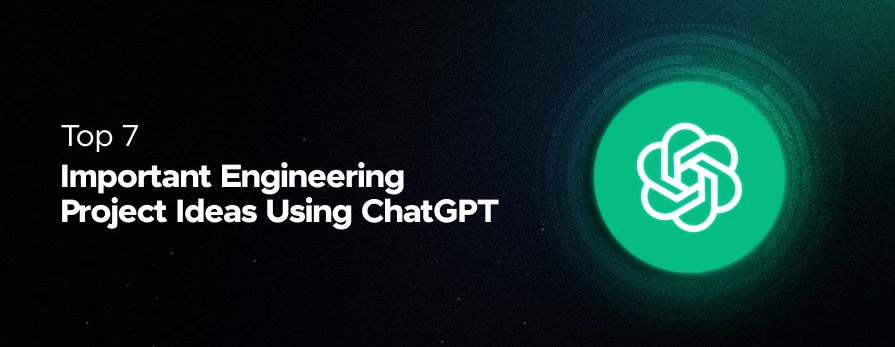
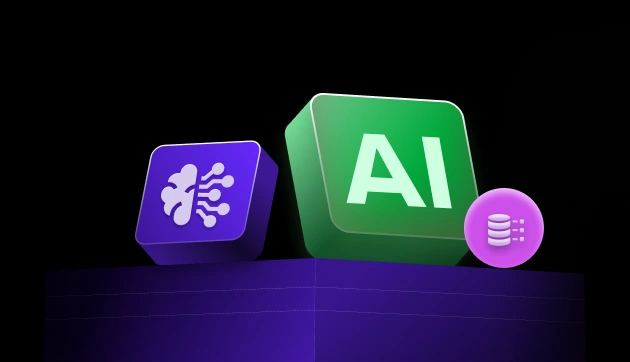
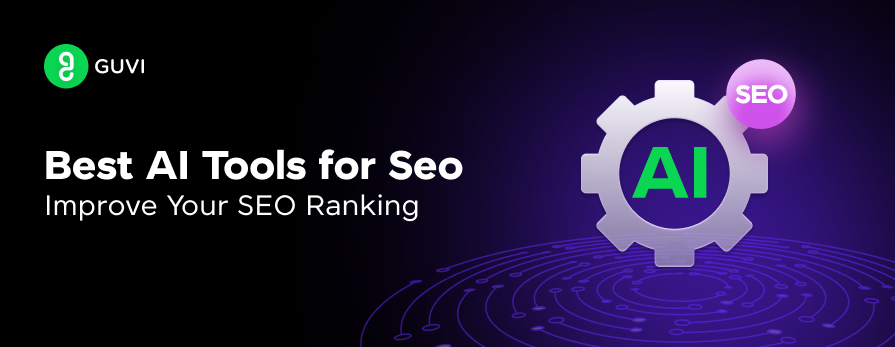
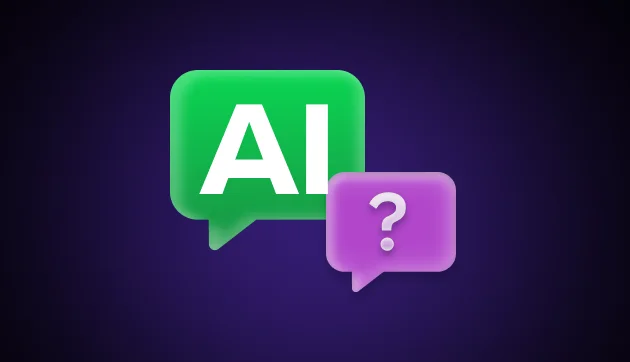

Did you enjoy this article?